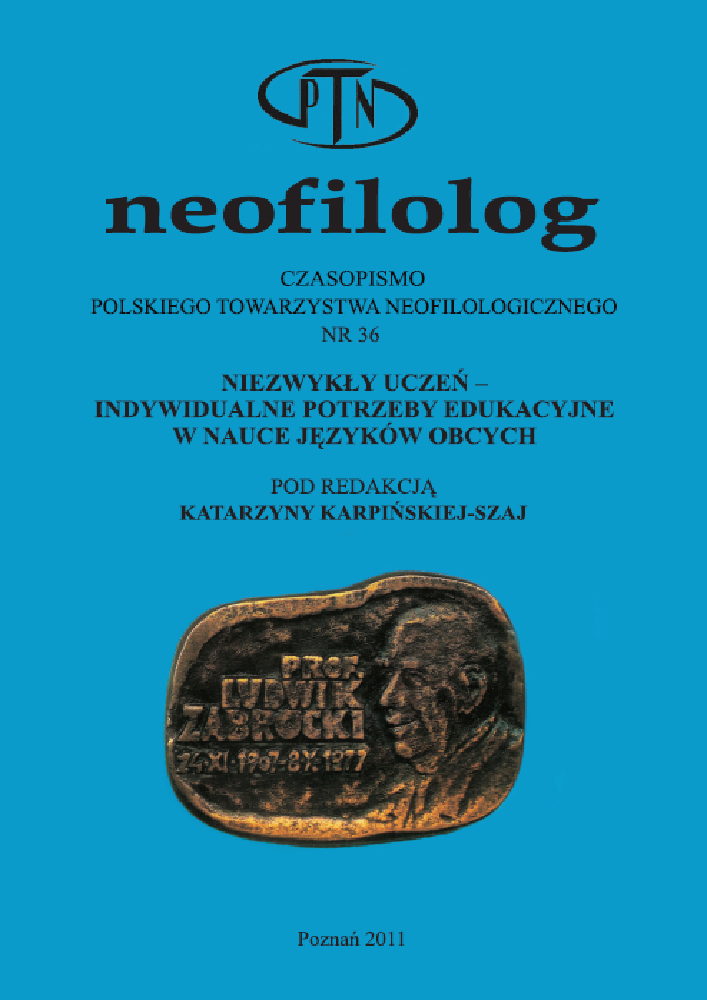Résumé
At present the main purpose of school integration is the pursuit of dialogue and ways of ensuring integration which concerns both disabled learners and the ones who do not exhibit special educational needs. In this paper, the is-sue will be incorporated into the framework of teaching foreign languages to disabled pupils attending public schools. The present author will depict L2 teaching goals in relation to education shared by pupils with and without specific learning difficulties as well as to problems with implementing the idea of integration in foreign language classroom. These questions will be discussed with reference to the opinions of gleaned from public school teachers with experience in working with disabled learners.
Références
Bambara, L. M. i T. P. Knoster. 2009 [1998]. Designing Positive Behavior Support Plans. Washington: American Association on Intellectual and Develop-mental Disabilities.
Bayliss, Ph. 2002. „Edukacja włączająca”. w: Bogucka, J. i D. Żyro (red.). Od nauczania integracyjnego do szkoły równych szans. Materiały z konferencji: Konstancin 28-19 października 2002. Warszawa: Wydawnictwo Centrum Metodycznego Pomocy Psychologiczno-Pedagogicznej. 21-37.
Błaszyńska, K. 1992. „Determinanty przystosowania ucznia niepełnosprawnego do środowiska szkoły masowej”. w: Hulek, A. i B. Grochmal-Bach (red.). Uczeń niepełnosprawny w szkole masowej. Kraków: Wydawnictwo WSP.
Bogucka, J. i D. Żyro. 2002. „Doświadczenia placówek integracyjnych a humanizm edukacyjny”, w: Bogucka, J. i D. Żyro (red.). Od nauczania integracyjnego do szkoły równych szans. Materiały z konferencji: Konstancin 28-19 października 2002. Warszawa: Wydawnictwo Centrum Metodycznego Pomocy Psychologiczno-Pedagogicznej. 12-20.
Canevaro, A. 2007. L’integrazione scolastica degli alunni cin distabilita. Erickson: Gardolo di Trento.
Chrzanowska, I. 2010. Problemy edukacji dzieci i młodzieży z niepełnosprawnością. Regionalna specyfika czy ogólnopolska tendencja. Kraków: Oficyna Wydawnicza Impuls.
Domagała-Zyśk, E. 2006. „Edukacyjne i terapeutyczne wartości lektoratu języka angielskiego dla studentów niesłyszących”. w: Krakowiak, K. i A. Dziurda-Multan (red.). „Nie głos, ale słowo…” Przekraczanie barier w wychowaniu osób z uszkodzeniami słuchu. Lublin: Wydawnictwo KUL. 423-431.
Karpińska-Szaj, K. 2010. „Uczeń z deficytem słuchu mowy w szkole masowej: specjalne czy ogólnodostępne materiały dydaktyczne?” w: Droździał-Szelest, K. (red.). Materiały edukacyjne w nauczaniu języków obcych – teoria i praktyka. Gorzów Wielkopolski: Wyd. Państwowej Szkoły Zawodowej w Gorzowie Wielkopolskim. 79-90.
Mazereau, Ph. 2009. « La formation des enseignants et la scolarisation des élèves handicapés, perspectives européennes: état des lieux et questionnement ». Les Sciences de l’Education pour l’Ere nouvelle: Les élèves handicapés à l’école, quelle formation pour les enseignants? Eclairages sur la situation européenne 42 (1). 13-30.
Szumski, G. 2006. Integracyjne kształcenie niepełnosprawnych. Warszawa: Wydawnictwo naukowe PWN.
Zawadzka-Bartnik, E. 2010. Nauczyciel języków obcych i jego niepełnosprawni uczniowie (z zaburzeniami i dysfunkcjami). Kraków: Oficyna Wydawnicza Impuls.
http://www.cmp3.ore.edu.pl/ (DW: 4. XI. 2010)
Licence
© Katarzyna Karpińska-Szaj 2011

Ce travail est disponible sous licence Creative Commons Attribution - Pas de Modification 4.0 International.
Auteurs :
Les auteurs de textes acceptés pour publication dans la revue Neofilolog sont tenus de remplir, signer et renvoyer à l'adresse de la rédaction, un accord sur l'octroi d'une licence gratuite pour les œuvres, avec obligation d'accorder une sous-licence CC.
En vertu de cet accord, les auteurs des textes publiés dans la revue Neofilolog accordent à l'Université Adam Mickiewicz de Poznań une licence non exclusive et gratuite et permettent l'utilisation de la sous-licence Creative Commons Attribution-NoDerivatives 4.0 International (CC BY-ND 4.0).
Les auteurs se réservent le droit de disposer librement de l'œuvre.
Utilisateurs :
Les utilisateurs d'Internet intéressés ont le droit d'utiliser les œuvres publiées à partir de l'année 2017 sous réserve des conditions suivantes :
- reconnaissance de la qualité d'auteur - l'obligation de fournir des informations sur la qualité d'auteur, le titre, la source (liens vers l'œuvre originale, DOI) et la licence, ainsi que l'œuvre distribuée ;
- sans créer d'œuvres dérivées - l'œuvre doit être conservée dans sa forme originale, p. ex. les traductions ou les interprétations ne peuvent être distribuées sans le consentement de l'auteur.
Tous les textes publiés sont soumis au droit d'auteur.
Autres :
L'Université Adam Mickiewicz de Poznań se réserve le droit à la revue dans son ensemble (mise en page, forme graphique, titre, conception de la couverture, logo, etc.).
.
